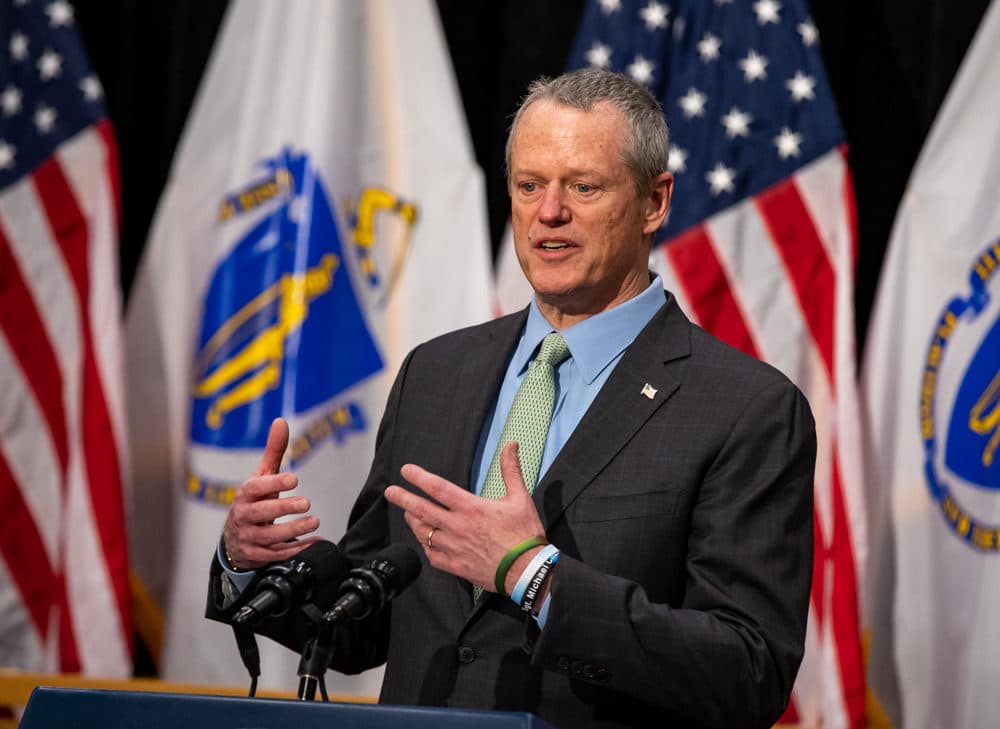Advertisement
As Deaths Rise At Nursing Homes, Updates On Mass.' COVID-19 Plans For Long-Term Care Facilities

As the number of coronavirus cases and fatalities at nursing homes and other long-term care facilities continues to rise, Gov. Charlie Baker focused much of his daily press conference on the state's efforts to support residents of those facilities and their families, as well as employees.
"We are intensely focused on mitigating the spread of illness in our senior living facilities," Baker said, adding that "these facilities — not just here in Massachusetts, but everywhere — are highly vulnerable settings for COVID-19."
As of Wednesday afternoon, 530 COVID-19 deaths had been reported in long-term care facilities in Massachusetts, and 4,163 residents and employees of the facilities had tested positive for the coronavirus. In addition, 222 long-term care facilities in the state had at least one case of COVID-19.
The governor announced the state would provide long-term care facilities with $130 million of additional funding, which Health and Human Services Secretary Marylou Sudders said she expected that would translate to higher staff wages.
Additionally, in an effort to boost staffing at long-term care facilities — strained in some places even before the pandemic — Baker said there will be a $1,000 signing bonus for anyone who registers to work for them through the state's online portal for a certain period of time.
On Monday, the administration also updated guidance to "encourage" widespread testing for residents of long-term care facilities "even if they have no symptoms."
This follows news that a plan to move healthy residents at the Beaumont Center in Worcester to another skilled nursing facility in Northbridge was temporarily put on pause after residents began testing positive for COVID-19. Another skilled nursing facility in Wilmington temporarily halted its plans to transform into a COVID-19 recovery building after testing of residents set to be transferred revealed more than half of them were positive for the coronavirus. All tested positive while asymptomatic, according to the health care owner.
Advertisement
However, the ramp-up to widespread testing is still hitting bottlenecks.
Baker said that by Tuesday, 4,500 tests had been collected at 264 senior living facilities, and that another 77 facilities had requested more than 8,600 test kits from the Broad Institute of Harvard and MIT, which would ultimately process those tests.
Broad director Eric Lander said in an interview with WBUR Wednesday that the Institute now has the capacity to run 4,000 diagnostic tests daily, "but the number of tests that we're getting is still much lower." Lander said this is due to bottlenecks in the collection system, like a shortage of swabs required for testing, and because people aren't aware that lab capacity exists.
"The testing capacity is right now outstripping the tests that people are doing," Lander said. "We've got a lot of residents of nursing homes in the state, and we really need to have a pretty comprehensive view of who's infected."
Baker also told reporters Wednesday that there are plans to convert long-term care facilities into "dedicated" COVID-19 recovery centers in Brewster, Falmouth, New Bedford, East Longmeadow and Great Barrington. He expects all five to be operational within the next 10 days, and said plans to create more dedicated recovery center across the state are in the works.
On Wednesday, Baker also noted a new support hotline for families with loved ones living at these facilities. Sudders said so far 1,100 individuals have used it.
Last week, the administration promised more resources for the hotline after families complained that they had trouble reaching anyone or getting useful information.

